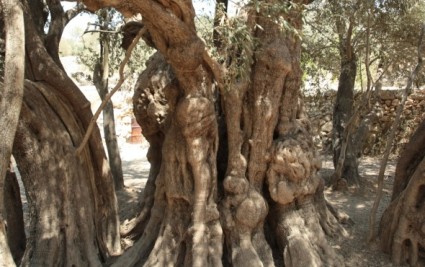The Olive Tree is the foundation of the home and target of Zionist Settlers
 Palestinian Farmer looks at Olive Tree Destroyed by Zionists in Hate Crime
Palestinian Farmer looks at Olive Tree Destroyed by Zionists in Hate Crime
‘The olive tree is the foundation of the home’
By Matthew Vickery – 6 November, 2013

The trunk of the Al-Badawi tree, claimed to be the oldest olive tree in the world.
‘The olive tree is the foundation of the home’, I was first told this phrase by a farmer in Al-Walaja village in the West Bank two years ago, while we attempted to make our way towards the village’s fields and olive trees. They had been stolen by the Israeli government to make way for a nearby illegal Israeli settlement. Israeli Defence Force (IDF) soldiers predictably stopped us and pushed us back, preventing us from going any further. During this year’s olive harvest, this scene is being repeated time and again in the occupied Palestinian territories, often with dangerous aggression from IDF soldiers and Israeli settlers, or through the settlers directly destroying the trees.
The olive tree is the symbol of Palestine, of sumud (steadfastness): the ability to hold on and stand your ground against all odds. Indeed, olive trees have the potential to live for thousands of years and it is Al-Walaja where arguably the oldest olive tree in the world resides. Named Al-Badawi (The Old One), it has been dated to an age of between 4,000-5,000 years.
The olive trees that dot the West Bank have provided an income to Palestinians, generation after generation, and as such, they are valued members of the family.
It is during olive harvest that this phrase always comes back to me, kick-starting my thoughts about the olive trees’ relationship with the foundations of the Palestinian home and family life, often both built on the steadfastness of the olive tree. The olives that are sold from the tree, which survives harsh winters and dry summers, provide when economic times are tough, when other income channels have failed. It is a tree, a simple and, by itself, rather straight-forward tree, yet the relationship between it and the families living in the West Bank is special.
Yet my optimism is always cut short – as happens frequently when I think about issues regarding Palestine. My mind may wander among the trees for a few minutes while passing the olive groves on shared services (shared taxis) in the West Bank, yet suddenly the olive trees stop and the stumps begin. Trees cut down because of the separation wall, a part-wall, part-fence structure created by the Israeli government citing ‘security’ reasons; yet hundreds of thousands of Palestinians remain on the ‘Israeli’ side.
In many cases, trees that were uprooted could have been given back to Palestinian families and replanted, but companies involved with the Wall project and financed by the Israeli government instead decided to sell a huge quantity of them.
Olive trees unfortunate enough to grow near illegal Israeli settlements or the Wall continue to be routinely uprooted by the army. It is not unusual for Israeli settlers to burn the olive trees near their settlements that have survived the gaze of the military; anyone who has watched the Oscar-nominated Five Broken Cameras may well be aware of this.
It may be just a tree, but the olive tree is a metaphor for Palestinian resistance, for their steadfastness and their generosity despite their situation (a situation which neither the UN nor the ‘international community’ seems to have the will to truly and fairly resolve). But just like the olive trees in the West Bank, Palestinians are rooted to this small part of the world, and often only to their own small districts; they are subject to the axe of an aggressive military, one that reduces trees to stumps, and people to ashes.
…source






























Add facebook comments
Kick things off by filling out the form below.
Leave a Comment